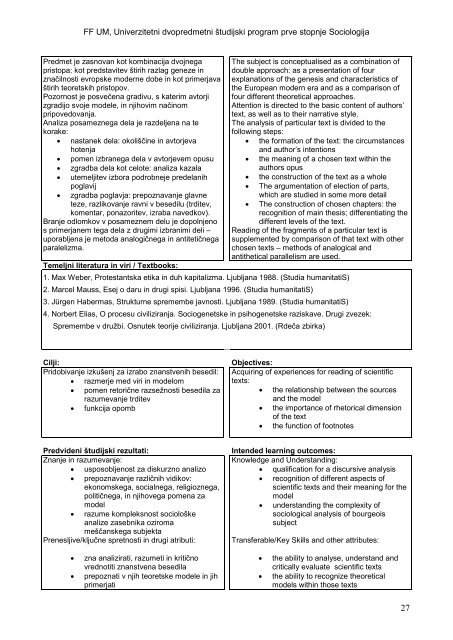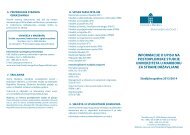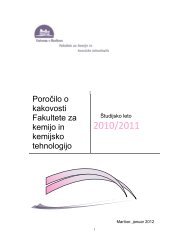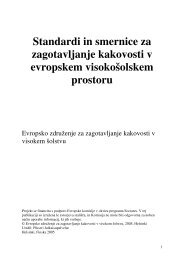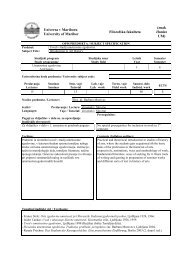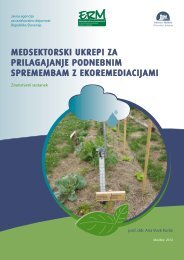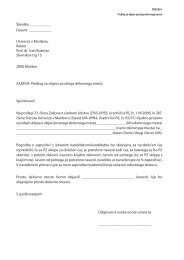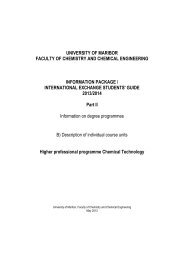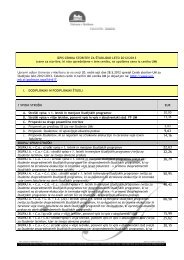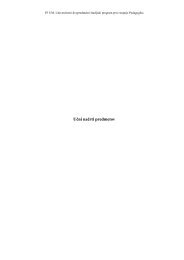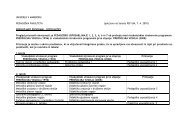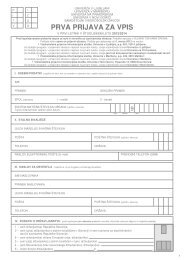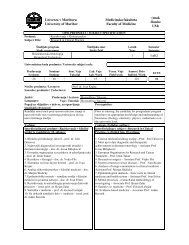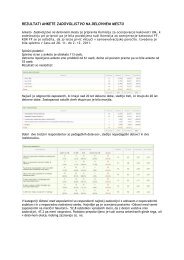uÄni naÄrti predmetov - Filozofska fakulteta - Univerza v Mariboru
uÄni naÄrti predmetov - Filozofska fakulteta - Univerza v Mariboru
uÄni naÄrti predmetov - Filozofska fakulteta - Univerza v Mariboru
Create successful ePaper yourself
Turn your PDF publications into a flip-book with our unique Google optimized e-Paper software.
FF UM, Univerzitetni dvopredmetni študijski program prve stopnje SociologijaPredmet je zasnovan kot kombinacija dvojnegapristopa: kot predstavitev štirih razlag geneze inznačilnosti evropske moderne dobe in kot primerjavaštirih teoretskih pristopov.Pozornost je posvečena gradivu, s katerim avtorjizgradijo svoje modele, in njihovim načinompripovedovanja.Analiza posameznega dela je razdeljena na tekorake:• nastanek dela: okoliščine in avtorjevahotenja• pomen izbranega dela v avtorjevem opusu• zgradba dela kot celote: analiza kazala• utemeljitev izbora podrobneje predelanihpoglavij• zgradba poglavja: prepoznavanje glavneteze, razlikovanje ravni v besedilu (trditev,komentar, ponazoritev, izraba navedkov).Branje odlomkov v posameznem delu je dopolnjenos primerjanem tega dela z drugimi izbranimi deli –uporabljena je metoda analogičnega in antitetičnegaparalelizma.Temeljni literatura in viri / Textbooks:The subject is conceptualised as a combination ofdouble approach: as a presentation of fourexplanations of the genesis and characteristics ofthe European modern era and as a comparison offour different theoretical approaches.Attention is directed to the basic content of authors’text, as well as to their narrative style.The analysis of particular text is divided to thefollowing steps:• the formation of the text: the circumstancesand author’s intentions• the meaning of a chosen text within theauthors opus• the construction of the text as a whole• The argumentation of election of parts,which are studied in some more detail• The construction of chosen chapters: therecognition of main thesis; differentiating thedifferent levels of the text.Reading of the fragments of a particular text issupplemented by comparison of that text with otherchosen texts – methods of analogical andantithetical parallelism are used.1. Max Weber, Protestantska etika in duh kapitalizma. Ljubljana 1988. (Studia humanitatiS)2. Marcel Mauss, Esej o daru in drugi spisi. Ljubljana 1996. (Studia humanitatiS)3. Jürgen Habermas, Strukturne spremembe javnosti. Ljubljana 1989. (Studia humanitatiS)4. Norbert Elias, O procesu civiliziranja. Sociogenetske in psihogenetske raziskave. Drugi zvezek:Spremembe v družbi. Osnutek teorije civiliziranja. Ljubljana 2001. (Rdeča zbirka)Cilji:Pridobivanje izkušenj za izrabo znanstvenih besedil:• razmerje med viri in modelom• pomen retorične razsežnosti besedila zarazumevanje trditev• funkcija opombObjectives:Acquiring of experiences for reading of scientifictexts:• the relationship between the sourcesand the model• the importance of rhetorical dimensionof the text• the function of footnotesPredvideni študijski rezultati:Znanje in razumevanje:• usposobljenost za diskurzno analizo• prepoznavanje različnih vidikov:ekonomskega, socialnega, religioznega,političnega, in njihovega pomena zamodel• razume kompleksnost sociološkeanalize zasebnika oziromameščanskega subjektaPrenesljive/ključne spretnosti in drugi atributi:• zna analizirati, razumeti in kritičnovrednotiti znanstvena besedila• prepoznati v njih teoretske modele in jihprimerjatiIntended learning outcomes:Knowledge and Understanding:• qualification for a discursive analysis• recognition of different aspects ofscientific texts and their meaning for themodel• understanding the complexity ofsociological analysis of bourgeoissubjectTransferable/Key Skills and other attributes:• the ability to analyse, understand andcritically evaluate scientific texts• the ability to recognize theoreticalmodels within those texts27


